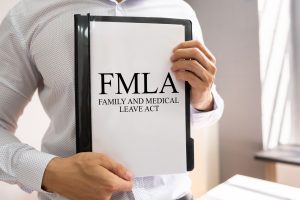A federal legislation known as the Family and Medical Leave Act (FMLA) provides eligible employees with up to 12 weeks of unpaid leave each year for particular medical needs and family-related difficulties.
In accordance with the FMLA, qualifying businesses must continue to provide qualified employees with health benefits while they are on leave. It is forbidden to retaliate against an employee for taking FMLA leave. Employees who think they have been the victim of retaliation should consult with a lawyer at PLBH. Contact us at (800) 435-7542 now for your legal consultation.
Information about the Family and Medical Leave Act
While many employees are covered by the FMLA’s benefits and protections, not all employees are. The Family and Medical Leave Act only applies to governmental agencies and commercial firms who retained at least 50 employees for at least 20 workweeks the prior year. Among public agencies are state and federal companies, educational districts, and government organizations.
Additionally, not every employee at these workplaces is covered by the FMLA. Before taking leave under the Act, the employee must have been employed by the employer for a minimum of 12 months and at least 1,250 hours. The employee must also work there or within 75 miles of a place where at least 50 people are employed.
Requirements of the employer
The employer is legally required to permit the employee to take up to 12 weeks of unpaid leave without terminating the employee if the FMLA’s regulations do apply to the employer-employee relationship. If an employee has a qualifying reason or condition, they can only anticipate this to apply to them.
Qualifying conditions and reasons include having a significant medical condition, caring for a close relative, giving birth to a child, placing an adopted or foster child, and experiencing a “qualifying emergency” related to active service. The 12 weeks of unpaid leave will also include health benefits for the employee.
What constitutes FMLA retaliation?
An employer is guilty of unlawful employment acts if they refuse to permit a leave of absence or fire or otherwise penalize an employee for taking a leave that they are entitled to. For violating the FMLA’s guidelines, the employee has the right to sue the employer in civil court or through a government agency. This type of situation is known as a “FMLA retaliation” claim, in which the employee asserts that the employer lacked the authority to penalize the employee for using FMLA leave.
Signs you have been the victim of FMLA retaliation
If a negative action is taken because you are taking the unpaid leave to which the FMLA allows you, it may be considered retaliation. As these claims can be very time-sensitive, you should always obtain legal counsel as soon as you suspect workplace reprisal of a claim you filed against your employer. FMLA retribution can include wrongful termination, demotion, hourly or wage loss, lost career opportunities, or harassment.
If your condition has been certified, your employer cannot urge you to return from your leave early. You cannot be asked to return to work or be given less responsibility by your employer. While your employer cannot limit what you do while on leave, you are still required to abide by the rules of employment.
After taking an FMLA-permitted absence, it is illegal to retaliate in any way. With our firm’s assistance, defend your rights. For a free case evaluation, get in touch with PLBH at (800) 435-7542 right away.

